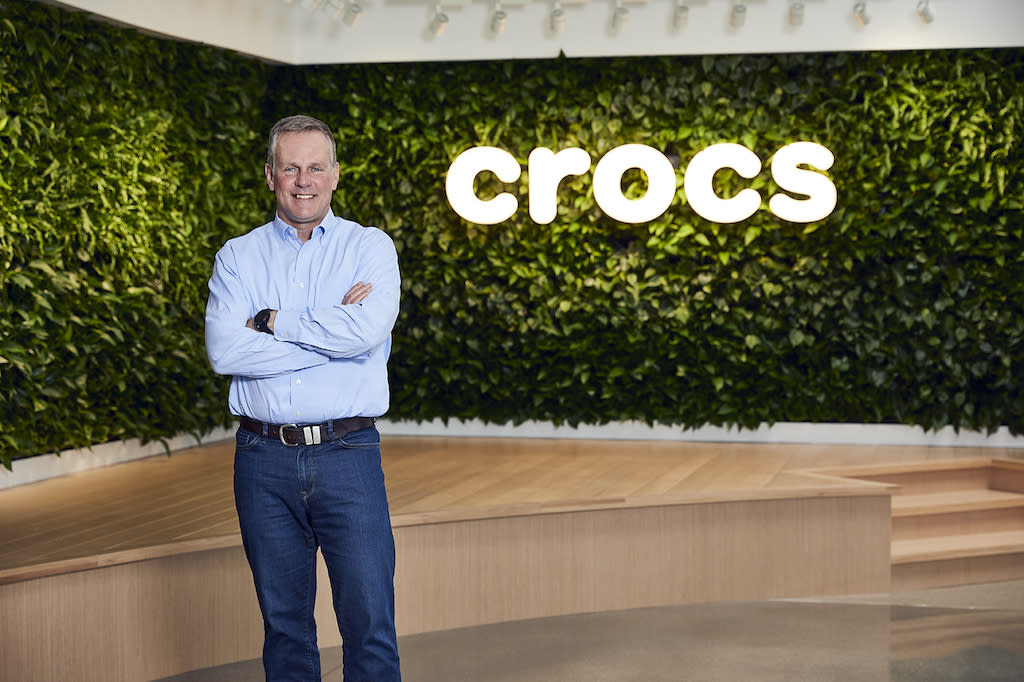Crocs’ CEO Knows His Brand Is Cool Again: Why Sustainability Is a Crucial Part of the Winning Formula

Love them or hate them, Crocs are having a moment.
The comfort-focused brand reported stellar Q2 results last week, continuing a pattern of monumental growth that exploded during the pandemic. Now, Crocs has announced a commitment to become entirely net zero by 2030. The sustainability initiative marks the brand’s next step to revitalize its brand image among younger consumers.
More from Footwear News
Q2 Earnings: VF Corp. Beats Estimates , Capri Holdings Rebounds From Pandemic + More
Salehe Bembury Reveals His Highly-Anticipated Crocs Collaboration
Like other footwear brands, Crocs’ recent success is, in part, due to a comfort-first mentality. But to go big, the brand had to shed its once-ridiculed brand identity. So Crocs tapped into the pulse of its consumers via TikTok and Instagram, and invested in a high-impact collaborations over the last year.
According to CEO Andrew Rees, Crocs is currently focused on attracting the type of consumer he calls the “explorer,” who is characterized by being young, expressive, self-confident, active on social media, and generally, though not exclusively, female.
Crocs’ new sustainability initiatives meant to minimize the brand’s carbon footprint and impact on the environment was the natural next step in the effort to win over the younger, Gen Z “explorer,” Rees said.
“The brands that they are interested in wearing and purchasing are very often supporting sustainability and social awareness,” he said. “We knew that through research, we knew that through social media. It was pretty well established.”
Rees said he believes that Crocs is often misunderstood when it comes to its impact on the environment, given the manmade appearance of the chunky and colorful clogs. In reality, 45% of the production scrap from Croslite, the main material used to make Crocs, is recycled. And while the majority of Croc’s sustainability efforts will be focused on materials used for footwear and packaging, Rees said the brand will also analyze ways to improve the environmental impact of its associated products, namely Jibbitz shoe charms and the recently launched Crocs Socks.
As part of the initiative, Crocs plans to use more sustainable ingredients for its products and packaging materials, with a goal to be a 100% vegan brand by the end of 2021. Crocs is also investing in methods for reusing and donating used products to keep used pairs out of landfills and plans to transition to “renewably sourced energy” in offices and distribution centers.
The commitment comes during a time of high demand for Crocs products overall. This adds “another layer of difficulty” to the production and fulfillment process overall, Rees said.
“It does make it harder, [but] I think it’s manageable,” he said. “We worked really hard on the overall timeline to make sure that we can be successful.”
Being back in physical offices has helped. Most US Crocs employees have been back to work in the company’s Broomfield, Colo., and Westwood, Mass. offices since early June. US Crocs employees are not required to be vaccinated, but unvaccinated employees must wear masks in the office.
“As a company, we are mostly back,” Rees said. “We think that’s important for the purposes of collaboration and working effectively together and getting most of these kind of projects done.”
More broadly, as the return to office continues across all industries, Rees sees no signs of trouble for Crocs’ future growth.
“We’re really inspiring consumers and giving consumers a lot of reasons to buy our product,” Rees said. “And so we’re very bullish on our long term growth prospects.”
Sign up for FN's Newsletter. For the latest news, follow us on Facebook, Twitter, and Instagram.

